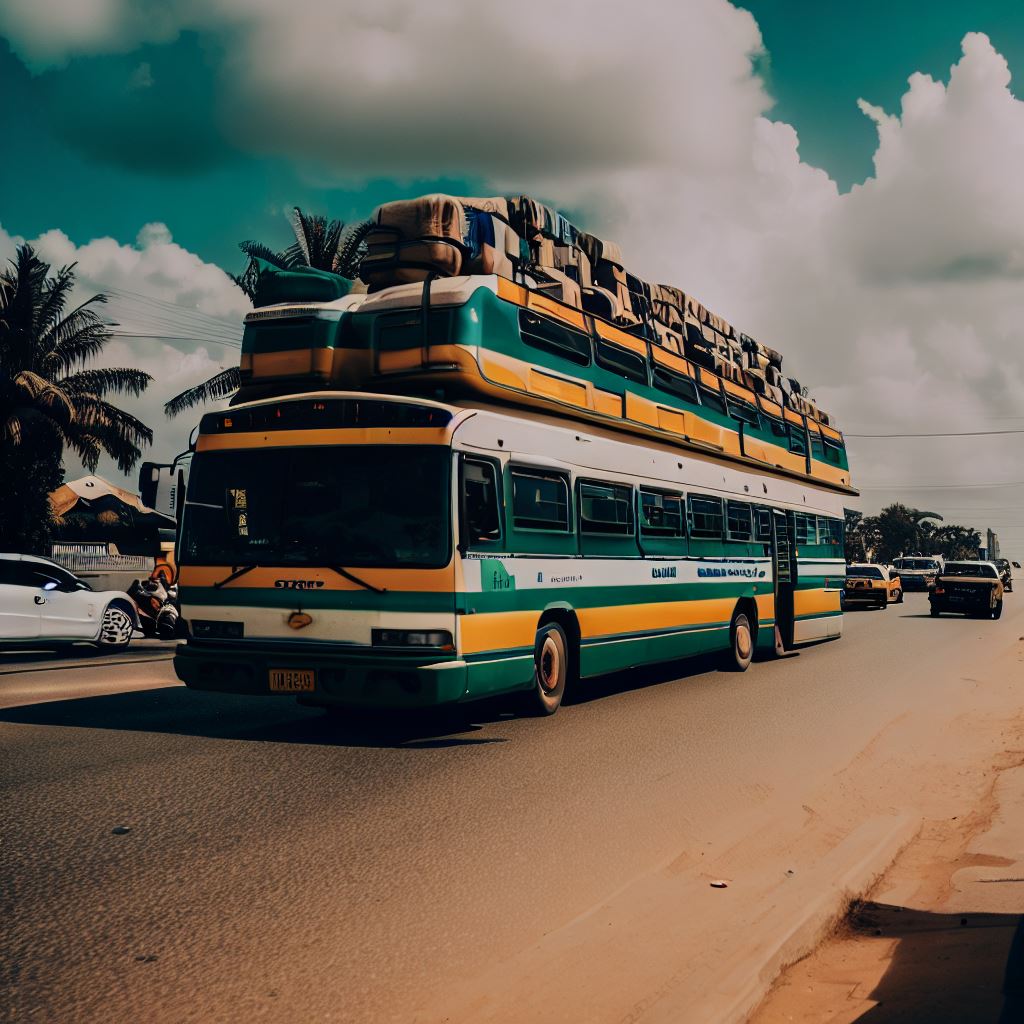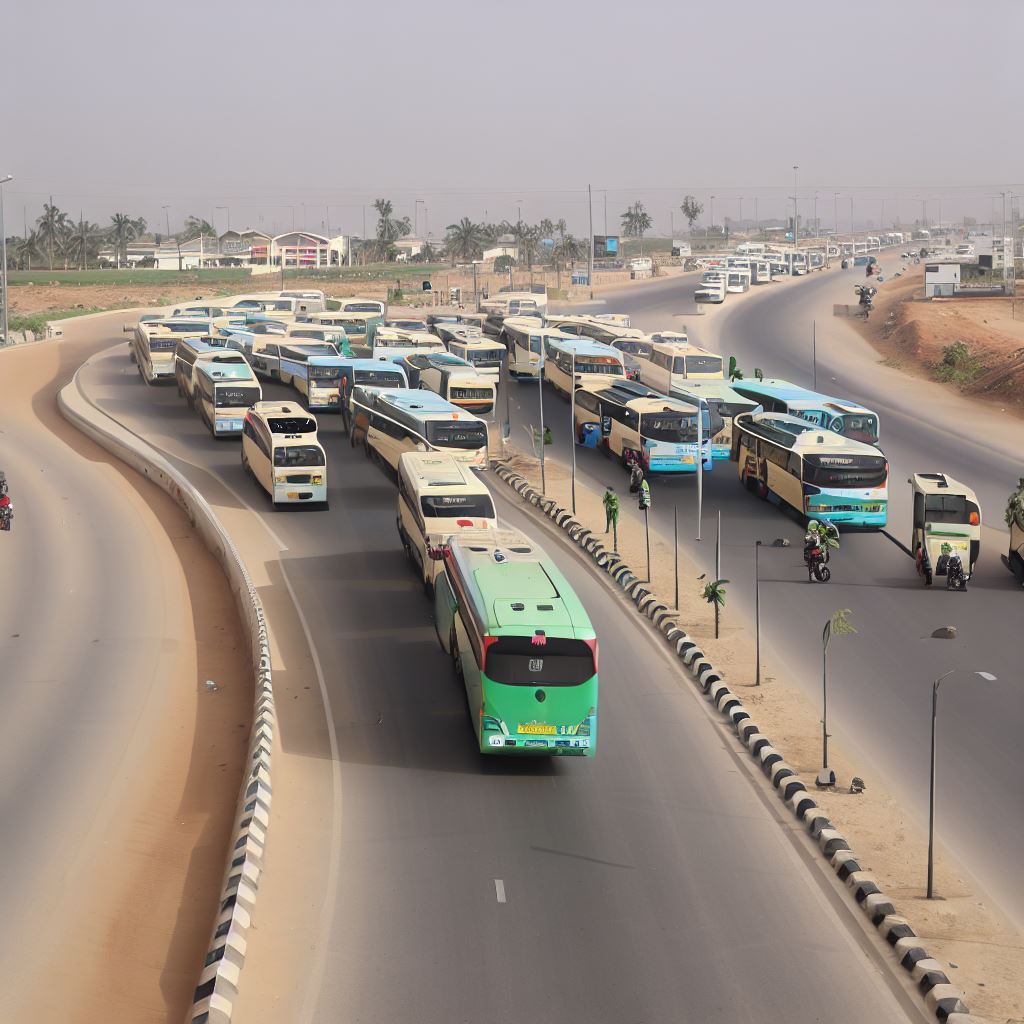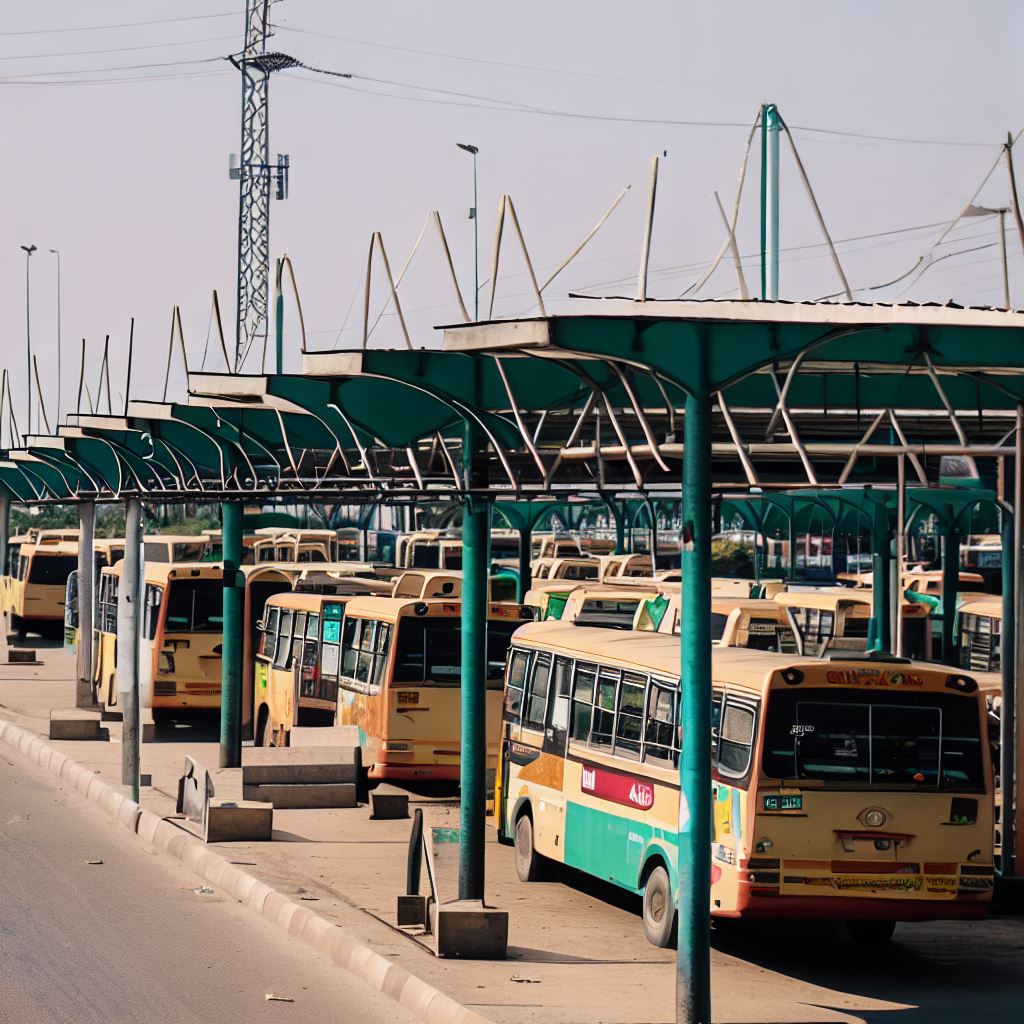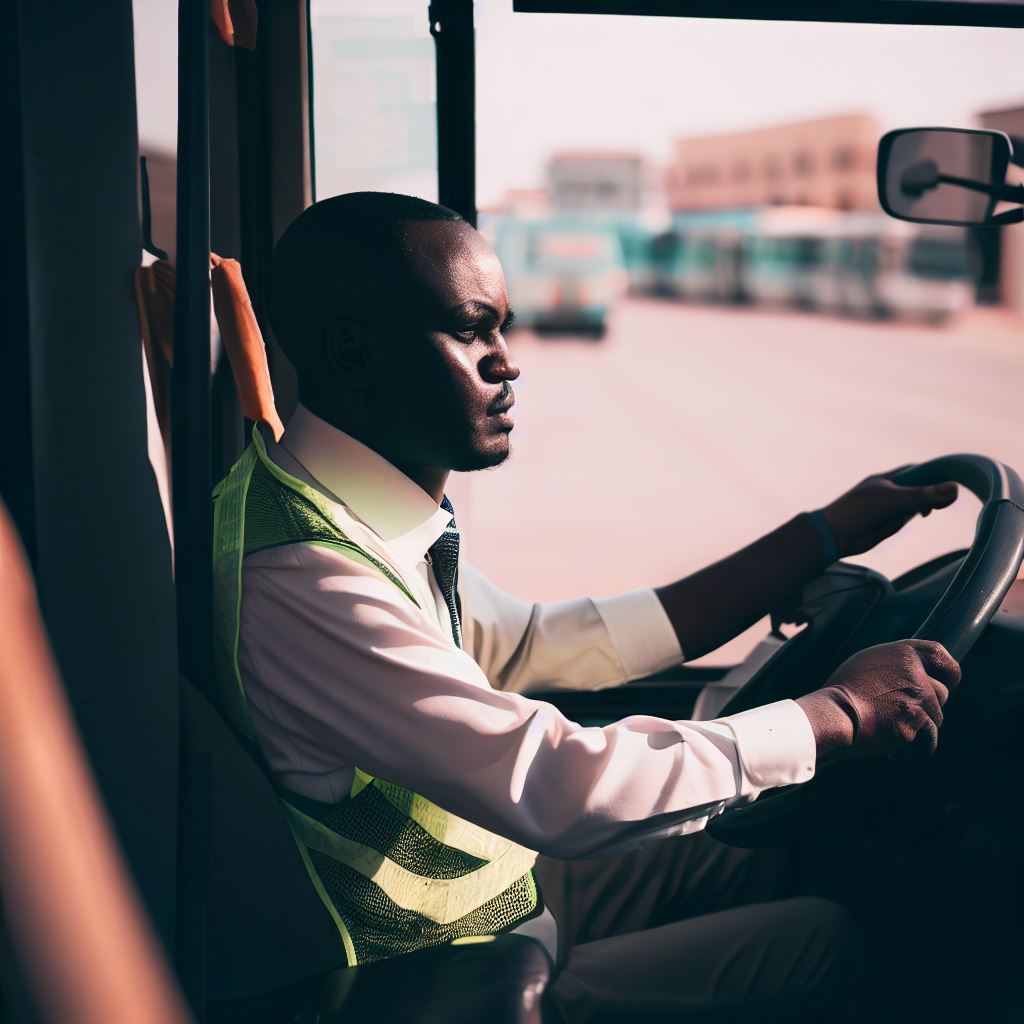Introduction
A. Brief Explanation of Intercity Transit in Nigeria
Intercity transit in Nigeria refers to the transportation system that connects different cities within the country.
It plays a crucial role in ensuring the movement of people and goods across the diverse regions of Nigeria.
This mode of transit serves as a lifeline for the nation’s economy, facilitating trade, tourism, and social interactions.
B. Introduction of the Perspective of a Bus Driver
As a bus driver, I have the unique opportunity to experience firsthand the challenges and the intricacies of intercity transit in Nigeria.
From the bustling streets of Lagos to the serene highways connecting rural towns, I witness the evolving landscape of Nigeria’s transportation system each day.
The responsibility of safely transporting passengers from one city to another has given me a deep understanding of the needs and concerns of both commuters and drivers.
In this blog post, I will provide an insider’s perspective on the operating conditions, road conditions, and the daily experiences faced by bus drivers in Nigeria’s intercity transit system.
Through my narratives, I will shed light on the various aspects that shape this complex industry, including government regulations, infrastructure development, and the impact of technology on the transportation sector.
Join me as I delve into the challenges, rewards, and untold stories that define intercity transit in Nigeria from a bus driver’s point of view.
Overview of Intercity Transit in Nigeria
A. Description of the Intercity Transit System
- Nigeria’s intercity transit system consists primarily of buses that connect different cities and towns.
- These buses are operated by both public and private companies, offering a range of services to passengers.
- The buses are designed to accommodate a large number of passengers with comfortable seating arrangements.
- Some intercity buses are air-conditioned, providing a more pleasant travel experience.
- The buses travel on well-established routes, making frequent stops along the way.
B. Importance and Role of Intercity Transit in Nigeria
- Intercity transit plays a crucial role in Nigeria as it provides affordable and accessible transportation options.
- It connects people residing in different cities, enabling them to travel for work, education, and leisure purposes.
- Many individuals depend on intercity buses for their daily commute between cities.
- Intercity transit also contributes to the economic growth of Nigeria by facilitating trade and commerce between regions.
- It promotes cultural exchange and tourism by allowing people to visit various destinations within the country.
C. Challenges Faced by the Intercity Transit System
- One of the major challenges is the poor condition of roads, which affects the efficiency and safety of intercity buses.
- Traffic congestion in urban areas leads to delays and longer travel times for passengers.
- Some intercity buses lack proper maintenance, resulting in frequent breakdowns and inconvenience for passengers.
- Inadequate infrastructure, such as bus terminals and rest stops, hinders the smooth operation of the transit system.
- Issues related to security and safety pose a threat to both passengers and bus drivers.
Intercity Transit in Nigeria serves as a lifeline for countless individuals, offering a dependable and cost-effective means of travel.
These buses, operated by both public and private entities, link various cities and towns, supporting work, education, and leisure pursuits.
With spacious interiors and some even offering air-conditioning, these buses prioritize passenger comfort.
Established routes with frequent stops streamline journeys, benefiting commuters daily.
Yet, challenges loom. Poor road conditions and urban traffic congestion hinder efficiency and safety.
Maintenance issues cause inconvenient breakdowns. The absence of proper infrastructure compounds these issues.
Despite these hurdles, Intercity Transit in Nigeria plays a pivotal role in connecting people, bolstering economic growth, and fostering cultural exchange.
Addressing these challenges is paramount, ensuring a seamless travel experience for all and strengthening the nation’s transportation network.
Role of a Bus Driver in Intercity Transit
A. Responsibilities and tasks of a bus driver
- Ensuring safe and comfortable transportation of passengers between cities.
- Following pre-determined routes and adhering to strict departure and arrival schedules.
- Collecting fares, issuing tickets, and providing accurate information to passengers.
- Maintaining cleanliness and orderliness inside the bus.
- Performing regular vehicle inspections and reporting any mechanical issues.
- Assisting passengers with luggage and ensuring their overall satisfaction.
- Implementing proper safety measures and protocols to prevent accidents or emergencies.
- Reacting calmly and responsibly in challenging situations, such as traffic congestion or unruly passengers.
- Communicating effectively with dispatchers and fellow drivers to coordinate operations.
B. Training and qualifications required for bus drivers
Bus drivers in intercity transit undergo extensive training and must meet specific qualifications:
- Obtaining a valid commercial driver’s license (CDL) with applicable endorsements.
- Being knowledgeable about traffic rules, road signs, and driving regulations.
- Completing training programs that cover passenger safety, first aid, and defensive driving.
- Demonstrating proficiency in operating large vehicles, handling passengers, and navigating routes.
- Passing background checks, drug tests, and physical examinations to ensure fitness for the role.
- Regularly participating in refresher courses and staying updated with industry developments.
C. Difficulties and risks faced by bus drivers in intercity transit
Bus drivers encounter various challenges and risks throughout their journeys:
- Dealing with unpredictable weather conditions, including heavy rain, fog, or extreme heat.
- Navigating through congested city roads or encountering challenging terrains on rural routes.
- Maintaining focus during long hours of driving, ensuring their own and passengers’ safety.
- Handling stressful situations, such as demanding passengers, delays, or unexpected road closures.
- Facing the risk of accidents due to reckless driving by other motorists or mechanical failures.
- Experiencing fatigue and health issues from irregular schedules and prolonged sitting.
- Coping with work-related stress and maintaining emotional well-being during challenging situations.
- Exposure to air pollution and noise pollution due to heavy traffic and urban environments.
- Being at risk of encounters with criminal activities or unruly behavior by passengers.
Despite these difficulties and risks, bus drivers play a crucial role in intercity transit, connecting people and facilitating economic growth.
Their dedication, professionalism, and commitment to passenger safety make them the backbone of the transportation system in Nigeria.
Read: Client Retention Strategies for Beauty Therapists in Nigeria
Daily Experiences of a Bus Driver in Intercity Transit
A. Start of the day: preparing the bus and checking it for safety
- Every morning, as a bus driver in intercity transit, my day starts by preparing the bus meticulously.
- I inspect the bus thoroughly, ensuring it is in top-notch condition before each journey.
- Checking the engine, tires, brakes, lights, and all other essential components is crucial.
- The safety of my passengers is my top priority, so I leave no stone unturned.
- I make sure all the safety equipment, such as fire extinguishers and first aid kits, are present and functional.
- Routine maintenance and regular servicing are key to avoid any unforeseen mechanical issues on the road.
- Once I am confident in the bus’s safety and reliability, I am ready to embark on my daily journey.
B. Interacting with passengers and assisting them with their needs
- As the bus driver, I have the privilege of interacting with passengers from diverse backgrounds.
- I greet each passenger with a warm smile and assist them in finding their seats.
- Some passengers may have specific requirements or questions, and I am always there to help.
- Providing information about the route, estimated travel time, and upcoming stops is part of my job.
- Ensuring a comfortable and pleasant experience for everyone on board is my utmost responsibility.
- I handle various situations with patience and professionalism, resolving conflicts if they arise.
- Being friendly and approachable helps create a positive atmosphere within the bus.
C. Dealing with unpredictable factors like weather conditions and traffic
- Intercity transit in Nigeria can be challenging due to unpredictable weather conditions.
- Heavy rains, storms, or fog can significantly affect the journey, causing delays or unsafe road conditions.
- As a bus driver, I must stay updated with weather forecasts and adjust my plans accordingly.
- Traffic congestion is another daily hurdle that I face during intercity travel.
- Maneuvering through congested roads requires patience and excellent driving skills.
- I monitor traffic updates via radio or navigation apps to find alternate routes whenever possible.
- Adapting to unexpected circumstances is part of the job, ensuring a smooth and efficient journey for passengers.
D. Ensuring safety and comfort throughout the journey
- The safety and comfort of my passengers are paramount as we embark on the intercity journey.
- I strictly adhere to traffic rules and regulations, maintaining a steady and cautious driving style.
- Smooth acceleration, braking, and steering contribute to a comfortable ride for passengers.
- I communicate important information, such as upcoming stops and necessary precautions, through the intercom system.
- Comfortable seating, proper ventilation, and a clean environment add to the passengers’ satisfaction.
- Regular breaks allow passengers to stretch their legs, use restroom facilities, or grab a quick snack.
- Finally, reaching the destination safely and on time is the ultimate reward for a bus driver in intercity transit.
In fact, the daily experiences of a bus driver in intercity transit involve diligently preparing the bus, interacting with passengers, managing unpredictable factors, and ensuring a safe and comfortable journey.
This challenging yet fulfilling role requires constant attention to detail, excellent communication skills, and the ability to adapt to different situations.
Read: Social Media Tips for Promoting Beauty Therapy in Nigeria

Challenges and Issues in Intercity Transit
A. Poor road conditions and their impact on transit operations
- The inadequate maintenance of roads in Nigeria poses significant challenges for intercity transit.
- Potholes, cracks, and uneven surfaces make it difficult for buses to provide a smooth and comfortable journey.
- These road conditions not only result in discomfort for passengers but also increase travel time and fuel consumption.
- Buses frequently encounter breakdowns due to the strain on their suspension systems caused by poor roads.
B. Inadequate infrastructure in rural areas
- Rural areas in Nigeria often lack the necessary infrastructure required for efficient intercity transit.
- The absence of well-maintained bus terminals and stops makes it challenging for passengers to board and disembark safely.
- Inadequate parking facilities and limited amenities such as restrooms and waiting areas further add to the inconvenience.
- Without proper infrastructure, the overall quality of intercity transit services suffers, affecting passenger satisfaction.
C. Overcrowding and lack of proper seating arrangements
- Intercity buses in Nigeria often operate beyond their seating capacity, leading to overcrowding.
- Passengers are forced to stand or sit in uncomfortable positions throughout the journey.
- The lack of proper seating arrangements not only compromises passenger comfort but also poses safety risks in case of sudden stops or accidents.
- Efforts to address overcrowding should focus on enforcing regulations and providing enough buses to accommodate demand.
D. Inefficient ticketing systems and long waiting times
- The ticketing systems in intercity transit often suffer from inefficiencies, resulting in delays and long waiting times for passengers.
- Poorly organized ticket counters and manual processes contribute to the problem.
- Passengers endure lengthy queues and unnecessary hassles to purchase tickets before their journey.
- Implementing electronic ticketing systems and online booking platforms can help streamline the process and reduce waiting times.
Read: Becoming a Bus Driver in Nigeria: Steps & Qualifications
Safety Measures and Regulations for Bus Drivers
A bus driver plays a crucial role in ensuring the safety of passengers and other road users.
To fulfill this responsibility, drivers must adhere to strict safety measures and regulations.
A. Compliance with traffic rules and regulations
- Bus drivers must always follow traffic rules and regulations to maintain order on the roads.
- They should comply with speed limits, stop at red lights, and yield to pedestrians.
- Using indicators while making turns and changing lanes is essential for safe driving.
- It is their duty to stay updated about any changes in traffic laws and modifications in road signs.
B. Defensive driving techniques and road safety practices
- Bus drivers should employ defensive driving techniques to anticipate and prevent potential accidents.
- Maintaining a safe following distance and avoiding distractions, such as mobile phones, is crucial.
- They should consistently scan the road, check blind spots, and use mirrors for proper situational awareness.
- Wearing seatbelts is mandatory for the safety of both drivers and passengers.
C. Maintenance and regular inspections of the bus
- Bus drivers must ensure regular maintenance of the vehicle, including routine inspections and servicing.
- Checking tires, brakes, lights, and other essential components is vital before each trip.
- Reporting any defects or malfunctions promptly to the relevant authorities is necessary.
- Keeping the bus clean and orderly not only enhances safety but also improves passengers’ experience.
D. Dealing with emergencies and crisis situations
- In case of emergencies like accidents or breakdowns, bus drivers should remain calm and composed.
- They should have knowledge of basic first aid techniques to provide immediate assistance if needed.
- Coordinating with authorities, such as police or road assistance, is essential during crisis situations.
- Evacuating passengers safely and efficiently in emergency situations is a critical responsibility.
In short, bus drivers have a significant role in maintaining safety on Nigerian roads.
By complying with traffic rules, practicing defensive driving, ensuring proper maintenance, and being prepared for emergencies, drivers contribute to a safer and more reliable intercity transit system.
Read: Continuing Education: Courses for Beauty Therapists in Nigeria
Improvements and Solutions for Intercity Transit in Nigeria
A. Infrastructure development and road maintenance
- Enhancing the quality of roads and bridges to ensure smooth and safe travel.
- Regular maintenance and rehabilitation of existing infrastructure to prevent deterioration and accidents.
- Investing in the expansion and modernization of bus terminals to accommodate growing passenger demand.
B. Incorporating technological advancements for better operations
- Implementing GPS tracking systems to improve route planning and minimize travel time.
- Introducing online booking platforms to enable passengers to reserve seats in advance.
- Installing CCTV cameras on buses and at terminals for enhanced safety and security.
C. Training programs and professional development for bus drivers
- Providing comprehensive training on defensive driving techniques and road safety regulations.
- Conducting periodic refresher courses to update drivers on the latest industry practices.
- Offering opportunities for skill advancement and career growth through certification programs.
D. Implementing effective ticketing and scheduling systems
- Introducing electronic ticketing systems to eliminate manual ticketing processes and reduce fraud.
- Developing user-friendly mobile applications for real-time bus schedules and seat availability.
- Enforcing strict adherence to departure and arrival times to improve reliability and minimize delays.
E. Government support and investment in the intercity transit system
- Allocating adequate funds for the development and maintenance of transportation infrastructure.
- Establishing regulatory bodies to ensure compliance with safety standards and fair pricing.
- Offering tax incentives and subsidies to private companies operating in the intercity transit sector.
By implementing these improvements and solutions, Nigeria can revolutionize its intercity transit system, offering passengers a safer, more efficient, and comfortable travel experience.
Delve into the Subject: The Impact of Renewable Energy on Jobs: Nigeria’s Wind Sector
Uncover the Details: Leading Customer Service Companies in Nigeria: A Review
Conclusion
Intercity transit in Nigeria is a complex and challenging system for bus drivers. The inadequate infrastructure, limited resources, and lack of regulations make their job difficult and unreliable.
However, it is vital for the government and relevant authorities to address these challenges and improve the system.
A well-functioning intercity transit network will not only benefit the bus drivers but also the entire population by promoting economic growth, facilitating trade, and enhancing connectivity between cities.
Encouragement should be given to initiatives that prioritize the establishment of a reliable and efficient intercity transit system in Nigeria.
This will enhance the overall transportation experience for passengers and contribute to the country’s development and progress.




